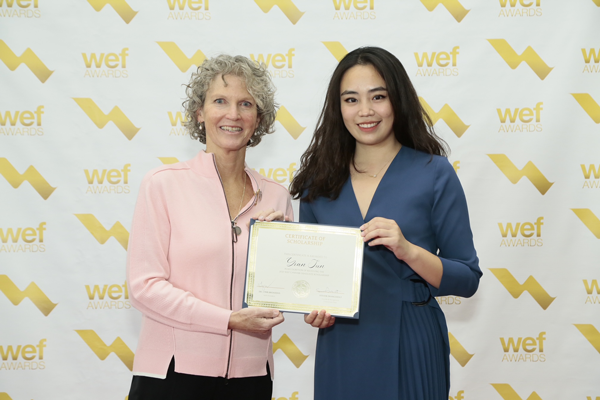Water Environment Federation Grants Scholarship to Doctoral Student Sun

Jan. 24, 2022 - Yian (Anne) Sun, a civil and environmental engineering doctoral student, was awarded the Canham Graduate Studies Scholarship ($25,000) from the Water Environment Federation at its annual WEF Technical Exhibition and Conference in the fall. Sun conducts wastewater engineering research in the lab of Diego Rosso, professor of civil and environmental engineering. She attended the global water conference to present her work on developing new methods of detecting and characterizing microplastics that are present in wastewater, especially during the stages of water reclamation.
She leads the microplastics monitoring program in Rosso’s lab. “Anne is passionate about her research, dedicated and independent,” said Rosso. “She is also a very dedicated teaching assistant for my courses. She is a role model for other students. Many undergraduate and master’s students rotate in the lab, and they all like working with her.”
Sun has been an Anteater engineer for eight years now. She received her UC Irvine acceptance notification on her birthday, March 18, 2013. It was one of nine U.S. college offers she had to choose from, but she felt the significance of the coincidence proved UCI was meant to be for her.
She met Rosso as an undergraduate when she joined UCI’s student chapter of Engineers Without Borders, a nonprofit humanitarian organization dedicated to improving the quality of life in emerging countries worldwide. Sun served as president of EWB in 2015-2016 and helped work on the design of a water pipeline and storage for a remote village in Madagascar. Rosso has served as the group’s adviser since the UCI chapter was established in 2008.
The WEF scholarship will help Sun with educational expenses as she finishes up her doctoral thesis research on microplastics property, fate and removal in water reclamation. The project involves examining how the contaminants are transported in wastewater and then developing and testing a low-cost, low-energy method for targeting and removal. She is collaborating with the Santa Margarita Water District to consistently sample different types of wastewater over the course of a year. The project is also supported by the engineering firm Brown and Caldwell. Furthermore, she is partnering with Colgate University in upstate New York to study the absorption and desorption of pharmaceutical residuals in wastewater on the surface of microplastics and the interaction of these different contaminants.
Sun’s overarching mission is to contribute to the one water concept, an approach that views all water – drinking water, wastewater, stormwater, greywater and more – as resources that must be coordinated holistically and sustainably. “Under a one water management system, all those water resources will be managed in an integrated way,” said Sun. “So instead of having different agencies and utilities who do not communicate with each other, they would all work under one umbrella so we can manage our water more sustainably.”
Sun grew up watching her father, a civil engineer in Shanghai, labor over blueprints that resulted in real-life infrastructure, bridges and tunnels for the subway. “I was amazed by the complexity of his engineering drawings and how they were turned into bridges and tunnels, and I became captivated by the idea of confronting challenges in civil engineering and ensuring public safety through engineering knowledge and innovation.”
She was also inspired by the dance classes she started taking at the Claire Trevor School of the Arts during her graduate studies, particularly by improvisation in hip hop. “I actually believe that arts and science share one kind of creativity,” said Sun. “It’s really amazing how the dancers must put in hours and hours of practice so they can use their vocabulary (movement) so flexibly. And that really changed my perspective on science. Instead of thinking about science through hardcore structured information, I started looking at it like vocabulary modules that I could use in a flexible way. That’s how I became more adventurous in my research ideas and in searching for research topics. That’s how I came up with my thesis.”
– Lori Brandt
